Book contents
- Frontmatter
- Dedication
- Contents
- List of Illustrations
- Acknowledgements
- Abbreviations
- Introduction: An Island of the Ocean
- 1 ‘Cadualadrus Conanum uocabit’: Political Prophecy in England, the Welsh March, and Ireland, c. 1130s–1260s
- 2 ‘E si finerount les heirs d'engleterre hors de heritage’: Galfridian Prophecy and the Anglo-Scottish Border, c. 1301–30s
- 3 ‘Whan shal this be?’ The English Erceldoune Tradition, c. 1310s–90s
- 4 ‘A dede man shall make bytwene hem acorde’: Cock in the North and Ceiliog y North, c. 1405–85
- Conclusion
- Bibliography
- Index
4 - ‘A dede man shall make bytwene hem acorde’: Cock in the North and Ceiliog y North, c. 1405–85
Published online by Cambridge University Press: 09 May 2017
- Frontmatter
- Dedication
- Contents
- List of Illustrations
- Acknowledgements
- Abbreviations
- Introduction: An Island of the Ocean
- 1 ‘Cadualadrus Conanum uocabit’: Political Prophecy in England, the Welsh March, and Ireland, c. 1130s–1260s
- 2 ‘E si finerount les heirs d'engleterre hors de heritage’: Galfridian Prophecy and the Anglo-Scottish Border, c. 1301–30s
- 3 ‘Whan shal this be?’ The English Erceldoune Tradition, c. 1310s–90s
- 4 ‘A dede man shall make bytwene hem acorde’: Cock in the North and Ceiliog y North, c. 1405–85
- Conclusion
- Bibliography
- Index
Summary
Sometime he angers me
With telling me of the moldwarp and the ant,
Of the dreamer Merlin and his prophecies,
And of a dragon and a finless fish,
A clip-wing'd griffin and a moulten raven,
A couching lion and a ramping cat,
And such a deal of skimble-skamble stuff
As puts me from my faith.
(William Shakespeare, 1 Henry IV, 3.1, 146–53)William Shakespeare's portrait of the prophetically enthused Welshman, Owen Glendower, whose ciphered musings are denounced by his pragmatic Northumbrian ally, Henry ‘Hotspur’ Percy, is perhaps one of the most famous, and most quoted, early modern depictions of medieval political prophecy. Its reference to the moldwarp, lion, and dragon borrows from the Prophecy of the Six Kings and the division of ‘Angleterre’ between three allies. As we find in Shakespeare's play, this prophecy has long been associated with the Tripartite Indenture, which historically, belongs not to 1403 (where Shakespeare placed it), but 1405, and allied Owain not with Hotspur, but his father, the first earl of Northumberland. The Indenture, an agreement between Owain, Northumberland, and Sir Edmund Mortimer, uncle to the young earl of March (who was understood by many to be Richard II's heir), reads as a blueprint for an enlarged independent Wales and a vast Percy lordship stretching from Norfolk to the Scottish border, with the remainder under the governance of Mortimer. Its ambition appears to have been for the creation of three autonomous dominions, understood as part of a confederated kingdom. It is unique among medieval political agreements in its incorporation of an allusion to the ‘Propheta’ (almost certainly Merlin), who foretold the division of ‘Britanniae Majoris’ between three allies. This reads as a reference to Galfridian political prophecies derived from the vision of the anti-English alliance of Prophetiae Merlini, 110–14, which found its most compelling later medieval reworking in the final sequence of the Six Kings.
From the Chronicles of Hall and Holinshed onwards, the anti-English alliance of the Six Kings has been associated with Owain, and has been understood to be the stuff of genuine Welsh prophetic belief. The image of the credulous Welshman rhapsodising about the moldwarp and the dragon has endured for centuries. However, the prophecy belongs to a tradition that is not Welsh but English.
- Type
- Chapter
- Information
- Prophecy, Politics and Place in Medieval EnglandFrom Geoffrey of Monmouth to Thomas of Erceldoune, pp. 155 - 198Publisher: Boydell & BrewerPrint publication year: 2016



